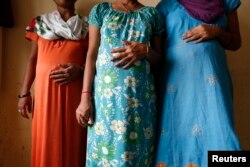Two thousand girls are killed every day due to a preference for sons in India, with most aborted or murdered just after birth, the country's minister for women and child development said.
Despite laws that ban parents from having tests to determine the gender of unborn children, sex-selective abortions remain a common practice in parts of India. They've resulted in a decline in the number of girls compared to boys.
"You have 2,000 girls who are killed in the womb every day. Some are born and have pillows on their faces choking them," Maneka Gandhi told NDTV news channel late on Monday.
India's 2011 census showed that while the overall female-to-male ratio has improved marginally since the last census a decade ago, fewer girls were born than boys and the number of girls younger than six plummeted for the fifth straight decade.
A May 2011 study in British medical journal The Lancet found that up to 12 million Indian girls were aborted over the last three decades, resulting in a skewed child sex ratio of 918 girls to every 1,000 boys in 2011, versus 962 in 1981.
India's traditionally male-dominated culture views sons as assets — breadwinners who will provide for the family, carry on the family name, and perform the last rites for their parents, an important ritual in many faiths.
Girls are often seen as a liability, with families having to dig deep for a substantial dowry to ensure a desirable match. In a culture that views premarital sex as bringing shame to the girl's family, parents also worry about their safety.
Gandhi said that the government's “Beti Bachao Beti Padhao” (Save the Daughter, Educate the Daughter) campaign, which aims to reverse the declining number of girls, had already shown results since its launch in January.
The initiative, which is being run in 100 districts where the ratio of girls to boys is particularly low, aims to better enforce laws that criminalize pre-birth gender selection and improve girls' access to education.
“We didn't expect results to show for at least a year or two years, if at all, as it's one of those mindset-change things,” Gandhi said in her first television interview since taking office last May.
She added that the campaign had led to an increase in unwanted girl infants ending up in orphanages but said this was a positive response as it meant they had moved "from being killed to being thrown out."
"The result is that hundreds of girl children are being thrown into orphanages in these 100 districts," the minister said. "In Amritsar, they have received 89 girls this month. In Tamil Nadu, they said the same thing. In all the districts we have chosen, they have a lot of girls going into palnas" or state orphanages.






